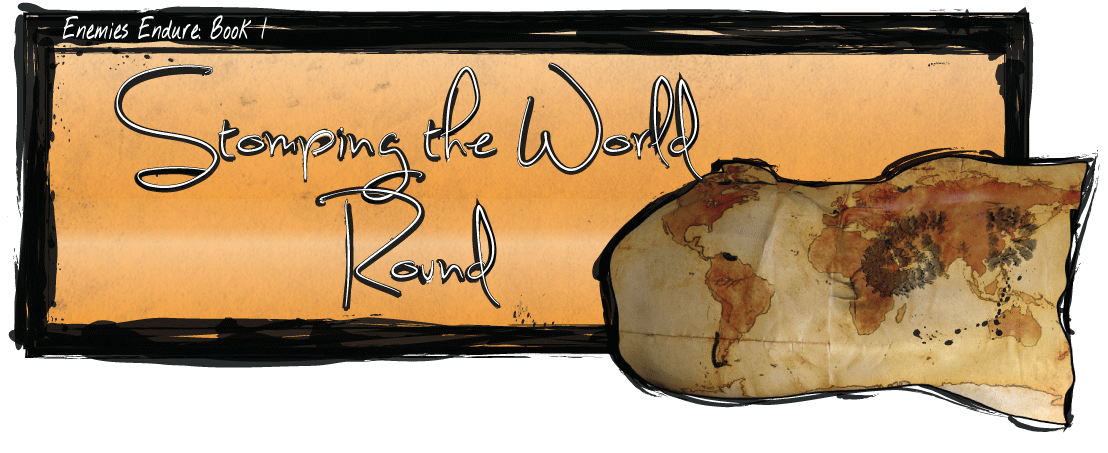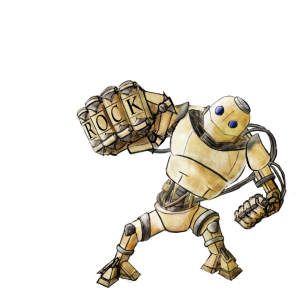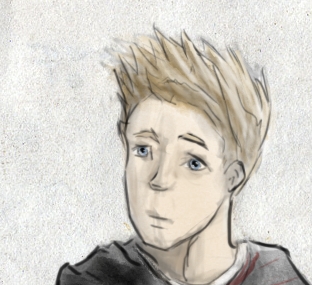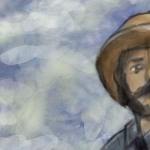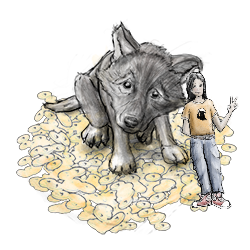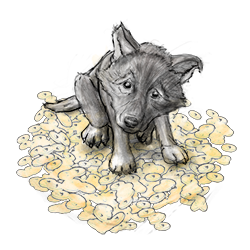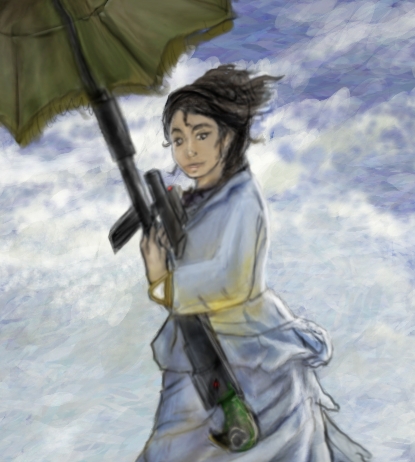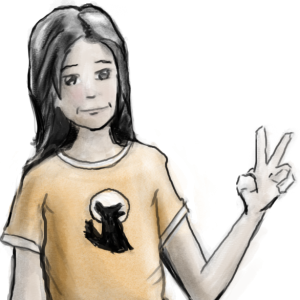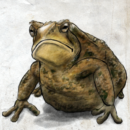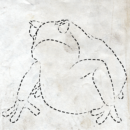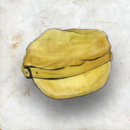– 1 –
All her life a toad has glowered at Amelia Friedman. She has lived an ordinary, sensible life, twenty-two years of it, and every time she thought to do anything different — even something so small as a wild haircut, or a spontaneous trip — she’s looked up to see the bile of the toad.
“That’s unnerving,” she says. “Stop toadying!”
That isn’t really an accurate description of what the toad was doing to begin with, but either way, it doesn’t stop.
Sometimes she cries from it. She wears her ordinary clothing and she lives her ordinary life and she cries because no matter how sensible she is she’s still a weird girl who gets glared and glowered at all the time by a toad nobody else can see.
. . .
Then one day Hans stops feeding the toad. He stops feeding his toad, because he’s dead.
Its eyes grow sleepy as it glowers at her.
It is losing interest.
One day Amelia daringly tries a bit of glitter on her fingernails and she looks up at the toad and the toad, it doesn’t even seem to care.
“See?” she says. She brandishes them at the toad. She can’t help it. It’s been serving as her superego all her life and her brain really can’t help running potential issues past the toad. “See? Glitter!”
The toad weightily turns away.
It drags itself out of her field of view.
. . .
A tingle rises from Amelia’s feet, lingers in her belly, then rises upwards with her arms and explodes in a yell of happiness. “Yeehah!”
She scatters the books from her bookshelf. She looks wildly up towards the toad.
It isn’t there.
. . .
Amelia calls her mother. She asks for I. P. Freeley. Her mother asks if she’s all right.
She throws out her pads and buys tampons, under the mistaken impression that this decision is somehow more wild and more free. She wears different-colored socks. She stays up until 11:30pm, wildly partying, and finally she begins to practice renegade alchemy and work on an elixir to make her immortal, omnipotent, and live forever.
That’s what the toad was for, of course.
It’s to glower at renegade alchemists, so they don’t do things like that!
. . .
She’s got talent, does Amelia Friedman. She’s barely started on her alchemy before she’s drawing bubble-diagrams and transmutation matrices all over the walls of her room — and in wild lipstick colors, no less! It’s less than a month before she’s transmuted gold into lead for the first time, and hardly two months longer than that before she’s done it the other way around.
“I could be rich,” she says, but then she laughs at herself. Rich! Her! Amelia Friedman! As if!
She blows through her money as fast as she makes it, instead, funding expeditions to dark and dangerous corners of the world, investigating old myths and mysteries, and forming a crack team of heroic archaeologists, chemists, and explorers to assist her in her work.
. . .
Deep under Lemuria, where a person ought not go, she loses her virginity to Brad Hamstock and threatens to marry him, whereupon he mysteriously vanishes from the expedition. Despite assiduous searching, no explanation is forthcoming; she concludes, after a while, that he must have been eaten by a snark.
Later she discovers herself pregnant.
“Oh, really,” says Amelia, in disgust.
. . .
Amelia corrals Bertram Gulley — he’s Mr. Gulley’s cousin, once removed, and a wizard at archaeology — and she complains to him. She puffs out her cheeks, then exhales. “Look at this!”
She shakes her belly at him.
He gives her a remarkable look.
“Do you realize what this means?” she says. “I shall have to stop drinking mercury.”
“Amelia,” Bertram says. “You shouldn’t be drinking mercury anyway.”
“Because I’m pregnant,” she explains.
“No,” he says, frustrated.
“It’s OK,” she says. She pats him on the head. “You’re a wizard at archaeology!”
He has a crush on her which shall never be requited.
. . .
“No mercury,” Amelia mutters. “No arsenic. Not even a jug of brandy. Think of the child!”
She goes a little spacey. She giggles. She thinks of the child, of her and the child, of running through the fields of the future, forever young, with her half-twin immortal child at her side —
“Do you think he’ll be a renegade alchemist?” Amelia asks, eagerly.
“I don’t —” says Bertram Gulley, but she’s already realized that the lost tablets of Lemuria and their bleak prophecies of the future may hold useful and relevant information about her child. She’s dashed off! She’s gone!
“I, I don’t know,” says Bertram, staring at an Amelia-shaped space of air where he can’t quite process that she’s gone.
. . .
“It’s a fair assumption,” Amelia explains to the nurse at the hospital, some months later. “I mean, renegade alchemy is presumably heritable.”
“Yes, ma’am.”
Hospitals are invariably nice to people who can transmute lead into gold. She is receiving the VIP treatment even though she persistently claims, whenever anyone mentions the notion, that she is simply an ordinary renegade alchemist of no particular account. Then she giggles and stares off at the golden future.
She still can’t get over the fact, almost three years later, that she can get away with saying things like that without being glowered at by a toad.
. . .
Bertram is beside her. He is squeezing her hand.
“It’ll be all right,” he says. “I’m sure of it.”
“Yes, Bertram,” she agrees.
. . .
It is a remarkably easy labor because there are no toads staring at her. It is physically agonizing of course but she distracts herself by thinking about alchemy. After a while it gets so renegade that it wouldn’t work even in a world with substantively relaxed natural laws; she finds herself muttering about congealing a philosopher’s stone by counteracting paper into rock and speculating on alchemical diagrams involving squares instead of circles; “see,” she says, squeezing Bertram’s hand and mumbling incoherently in his direction, “instead of self-creating, it takes four sharp right turns —”
She tenses. Pain rises. Pain passes. She breaks from her child, and it from her, it passes born into the world, and the doctor stares into the nictitating membrane of its eyes.
